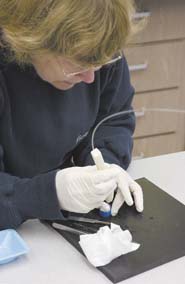  |
| HOME | THIS ISSUE | CALENDAR | GRANTS | BACK ISSUES | < BACK | NEXT > |
Technology Incubation Program helps bring ideas to fruitionby Pat Keefe - October 24, 2005 |
||||
|
Conversion Energy Enterprises, a privately held corporation that develops laser products for medical applications, has come up with a biomaterial with the potential to close a wound by welding tissue with a laser instead of stitches. Bringing it to market will be accomplished with the help of the University’s Technology Incubation Program. This past summer, the company moved from New York state to lab space on the Health Center campus as part of the Incubation Program, which provides space, services, and access to University resources for early-stage companies with strong commercial potential. Incubator space is available at Storrs and the Avery Point campus, as well as at the Health Center. Rita Zangari, the incubation program’s director, says these locations “provide unique access to a critical mass of faculty and students in a variety of scientific areas.” Barbara Soltz, chief executive officer of Conversion Energy, says relocating from New York to the Health Center was easy, and a good business decision. “We came to Connecticut because the technology incubator offered benefits for a start-up company such as ours,” she says. “Those benefits included lab and work space, but also the potential for collaboration with researchers and clinicians. The incubator is just what we need, and we’re looking forward to a mutually beneficial relationship with UConn.” The incubation program was established in 2002 with the construction of the Advanced Technology Laboratory Building in Storrs. The University had a number of reasons for starting the progam: Commercialization support programs can be helpful when recruiting top-notch faculty; successful incubator companies benefit University research programs, as well as providing jobs for students and graduates; and the program helps UConn fulfill its land-grant mission of service in the area of economic development.
UConn has a particular interest in start-up companies that are established based on University intellectual property, because their success can mean income for the institution and its researchers. Many, but not all, incubator companies at UConn are based on intellectual property owned by the University. Some of those that aren’t, such as Conversion Energy, are planning or already have collaborations with faculty or students that may attract new grant funding, such as Small Business Innovation Research or Small Business Technology Transfer grants. Conversion Energy has a grant from the National Institutes of Health to finish development of a gastrointestinal hernia repair system. Soltz estimates that the product could be in clinical trials in one and a half to two years, and it might be three to five years before the product is on the market. It would probably have taken a lot longer without the resources of the UConn incubator, she says. Zangari says, “Incubators provide an environment to nurture company growth. That may mean connections with other scientists or business people, as well as cost-effective space with access to resources that are important to the success of a company. Incubators offer a built-in network for company staff and leaders to remain connected to other scientists and entrepreneurs.” |
| ADVANCE HOME UCONN HOME |

